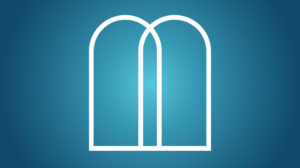Only One

The story is told of a staunch maamin who faced an agonizing moment of challenge — perhaps before an auto-da-fé or inside the gas chamber. Confronting his destiny, he asserted, “I
The Thirteen Principles of Emunah define the crucial underpinnings of our life in This World, and they’re our entrance ticket to eternal life. At the same time, they are detailed, precise — and multifaceted. The first four principles, which deal with the existence of Hashem, are particularly abstract to us mortals.
Look Only Ahead
Where do we start? Let us begin… at the very beginning. The Torah opens with “Bereishis.” And the beginning of “the beginning” is the beis, the very first letter of the Torah.
The Midrash Rabbah tells us the significance of the Torah’s initial letter: The beis is enclosed on three sides and open only on the left, indicating that there’s information that is blocked from us. We are not permitted to ask, “What’s under and above; what’s before and after?” The structure of the beis signifies that we cannot fathom worlds that lie beyond our own (“what exists under and above”), nor may we investigate what was before Creation and what will be at the End of Days. Just as the beis opens forward, so we can only examine our world from the moment of Creation until the conceivable future.
The Midrash continues, quoting Sefer Devarim (4:32): “For ask now about the days of the past, from the day that Hashem created man upon Earth, and from one side of the heaven to the other…” These are the parameters, in time and in space, of what we can investigate and perceive. Our existence as sojourners at this time and in this place — Olam Hazeh — precludes questions such as: What was before Creation? How did Hashem choose what to create? What will happen after the world ends? Additionally, and more importantly, we don’t have direct knowledge of the Creator Himself. We know of Hashem only that which He has chosen to reveal to us in the Torah. As the Sefer HaIkrim (2:30) writes, “Ilu yedativ, hayisiv, If I knew Him — I would be Him.”
For this reason, we can’t delve too deeply into the first four Principles, as they are unfathomable to most. We can only develop a basic understanding of them and focus on the impact of their meaning on our lives.
How, indeed, does the life and inner world of the believer differ from that of the nonbeliever? Chazal tell us, “One who has pas b’salo (bread in his basket), yet worries about tomorrow, is weak in emunah.” The Belzer Rebbe Rav Yissocher Dov’s interpretation of these words is unique and piercing: This person manifests a deficiency in emunah not because he lacks bitachon that Hashem will provide him with the next day’s food, but because he is complacent about today’s bread! Does he not recognize that he is no richer today than tomorrow, that the pas in his hand is not truly his own; that he depends, moment by moment, on Hashem’s largesse?
One and Absolute
The very first principle of the Yud Gimmel Ikrim is the core belief of Judaism and the axis around which all the other twelve revolve: I believe with perfect faith [that Hashem exists], that He, the Creator, fashions and supervises everything, and that He alone has formed, continues to form, and will form all that exists.
This Principle is based on the first of the Ten Commandments, Anochi Hashem Elokecha. It is a constant mitzvah that can be fulfilled at any time; one is rewarded for each moment that he contemplates and believes in these words.
What are the details of this assertion? Just as we “know” that we exist, so must we know that Hashem exists. Hashem’s existence is independent and absolute; everything else was created by Him and depends on Him. It may appear that the universe stands autonomously and that the laws of nature advance automatically, but this is untrue. Hashem continues to fashion, sustain, control, and direct all of creation. If He were to withdraw His influence from the world even momentarily, all existence would revert to nothingness. It would simply cease to exist.
Even when Hashem uses agents to carry out His Will — for example, the sun illuminates the Earth — it is He who is the active “doer,” not the agent. He never assumes a merely supervisory role. Rav Eliyahu Dessler points out that when we see someone writing with a pen, we never say, “the pen is writing.” Instead, we say, “the person is writing.” Although technically the pen is doing the writing, it’s clear that the person is the writer and the pen is merely his implement. This is exactly how we must view the “implements” of Hashem: He, not the sun, is illuminating the Earth.
Indeed, the maamin is not deceived by the sun, the landscape, and the bread in his basket. These may seem solid, real, and stable, but, in fact they are illusory: the only reality in our lives is the Will of Hashem that sustains all existence. The believer recognizes and is grateful to the true Source for every portion of sustenance and for every moment of life.
We acknowledge this concept often. Our recitation of borei nefashos concludes with the words, “Baruch chai haolamim, Blessed is He who is the Source of Life for the world.” And the words of Kaddish refer to the world as “di v’ra cherusai; that which He has created according to His Will.”
Who Created Suffering?
When one becomes accustomed to look at the world through the lens of emunah, it is relatively easy to attribute breathtaking scenery, celestial orbs, and the intricacies of nature to the Will of the Creator. But what about conflict, disease, and evil? Suffering, pain, and ugliness? Who created these? The second Principle states: I believe with perfect faith that the Creator is One and Unique, and that there is no oneness that can be compared to His, and that He alone is our G-d who was, is, and always will be.
This Principle, often referred to as achdus Hashem or yichud Hashem, tells us “Hashem Elokeinu Hashem Echad,” He is One; the only One Who exists. It, too, is a constant mitzvah and it follows naturally from the first Principle, which declares that everything in the world is Hashem’s handiwork. Rav Pincus recounts this anecdote about the Maharil Diskin: when he was a young child, his father told him that Hashem is One. “Of course!” the boy responded. “If ‘the entire world is filled with His glory, (Yeshaya 6,:3)’ then there is no room for anything else at all!”
Yichud Hashem declares: not only are there no gods other than Him, but nothing else exists at all, besides Him — the one infinite, independent, indivisible Hashem. Ein od milvado!
What does this mean? Don’t trees, fish, water, the sun, you, and I, exist? Yes, they exist but they do not exist independently. All of creation, as well as everything that happens, comes from One Source: Hashem. Included on this list are things that seem evil and troublesome — the yetzer hora, obstacles, challenges, and difficulties. These do not stem from external sources, for there are no external sources.
Ancient idolaters believed that there were two gods, the “good god” who brought blessing to the world, and the “bad god” who unleashed trouble and tragedy upon mankind. We know and believe that Hashem created everything in the world for a specific purpose, leading to one unified goal. As difficult as it is for us to comprehend, ultimately everything is good, because it all comes from Hashem, Who is only Good.
Why did Hashem, the very essence of goodness, create struggle and troubles? The Ramchal explains that Hashem created us so that He can bestow good upon us. In His wisdom, Hashem knew that in order for this good to be complete, it would need to be received as reward for our labor. He created us as imperfect beings so we can receive Olam Haba for the work of perfecting ourselves. Growth commonly occurs as a result of struggle and challenge; these factors are therefore part of Hashem’s creation.
The Nesivos Shalom says that we cover our eyes when we say Shema Yisrael Hashem Elokeinu Hashem Echad to indicate that there is nothing to see, for nothing exists other than He. Not the gas chamber, not the bread in the basket, not the pen in the hand, not the radiant sun. There is only One: One Creator, One Director, One Plan, and One Purpose.
Indivisible
There is yet another dimension of the second Principle. The Rambam writes, “No singular creation in the entire universe is ‘one’ like Him.” All physicality is composed of components: humans have limbs and organs, flowers have petal and stems, tables are made of wood and hardware, water is a compound of hydrogen and oxygen, even atoms can be divided into subatomic particles. Anything that was created can be broken down into subparts, or building blocks. Hashem, however, is not a creation, and He is the only One who is indivisible.
There is more. The Rambam writes in Hilchos Teshuvah (5:5) that the concept of Oneness also includes Hashem’s thoughts and judgments. “Hashem’s thoughts are not external to Him; rather, He and His thoughts are One, something which our minds cannot truly fathom. Since we cannot perceive Him, we also cannot understand His thoughts [for they are inseparable from Him], as the Navi writes (Yeshaya 55:8), ‘for My thoughts are not your thoughts and your ways are not My ways.’ Similarly, we are incapable of comprehending His foreknowledge of man’s actions.”
This perspective — that Hashem’s thoughts are One with Him — has far-reaching implications. The Torah itself can be defined as “Hashem’s Will” or “Hashem’s thoughts,” and Rav Chaim Volozhin in Ruach Chayim relates this to the Zohar’s comment that “Oraisa v’Kudsha Brich Hu chad Hu, the Torah and Hakadosh Baruch Hu are One.”
The concept that the Torah is included in the Oneness of Hashem means that it is one indivisible unit. All its words are interconnected, and its mitzvos form a cohesive, unified system. The Ruach Chayim and the Maharal enumerate the ramifications of this assertion. In halachah, a sefer Torah which is missing just one letter is not “almost whole,” but passul, invalid. One who rejects one single mitzvah is not “a virtual believer,” but a heretic. Someone who has been taught only one verse of Torah must honor his teacher, for this one verse is his gateway to the entire Torah. And, because all mitzvos are interconnected, mitzvah goreres mitzvah, one mitzvah leads to another. Once we connect to any part of ruchniyus, we — mortal, finite, oblivious creations — have touched infinity, and the possibilities are endless!
Sources include: Rav Shimshon Pincus, Rav Moshe Shapiro, Rav Ezriel Tauber, Yud Gimel Ikrim L’Rambam by Rav Bentzion Epstein.
(Originally featured in Family First, Issue 465)
Oops! We could not locate your form.










